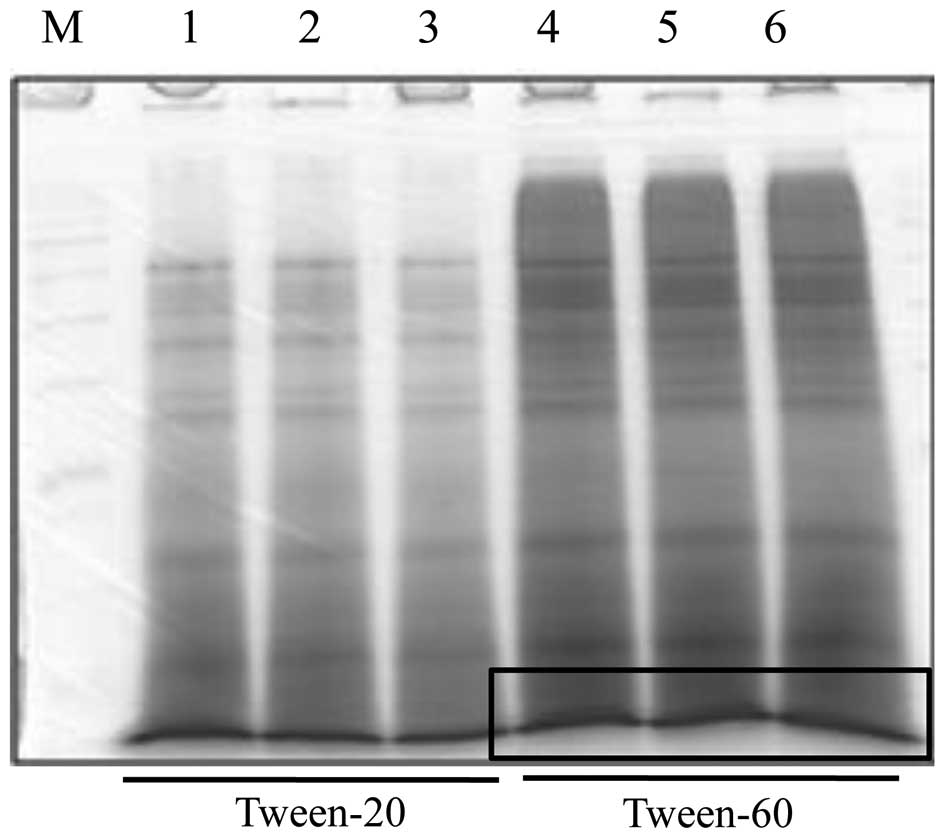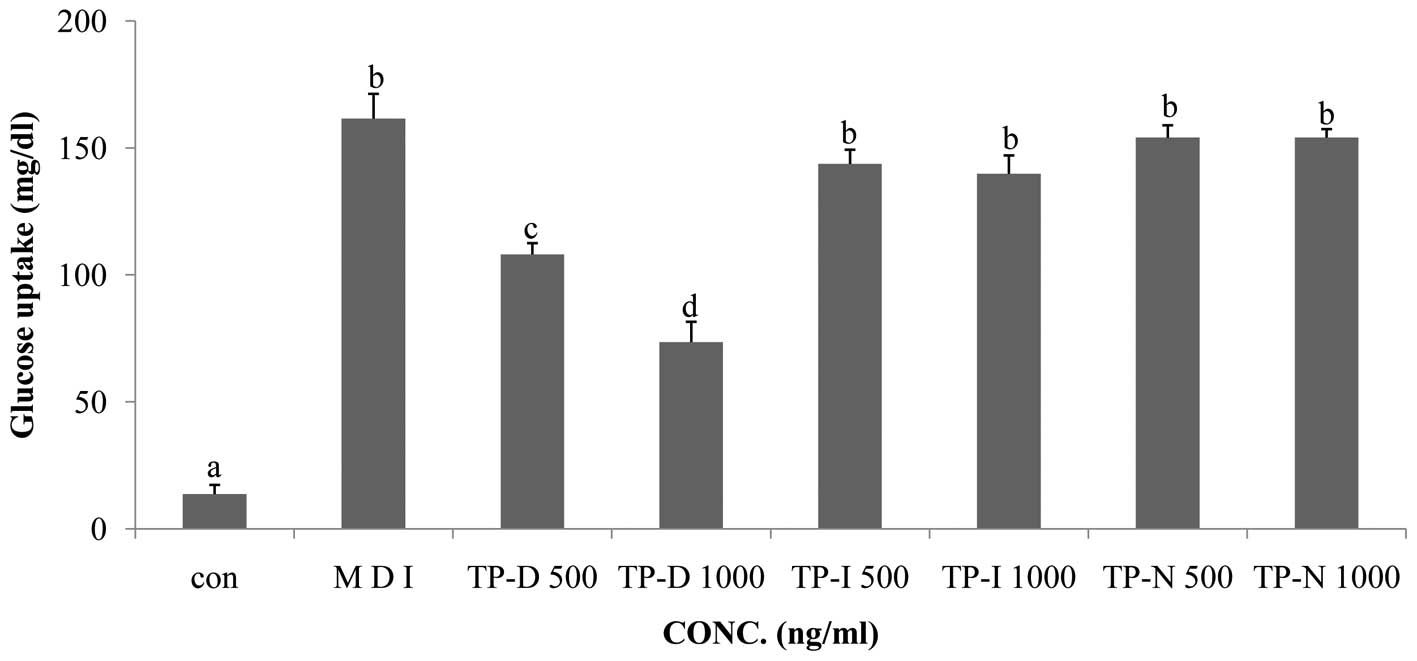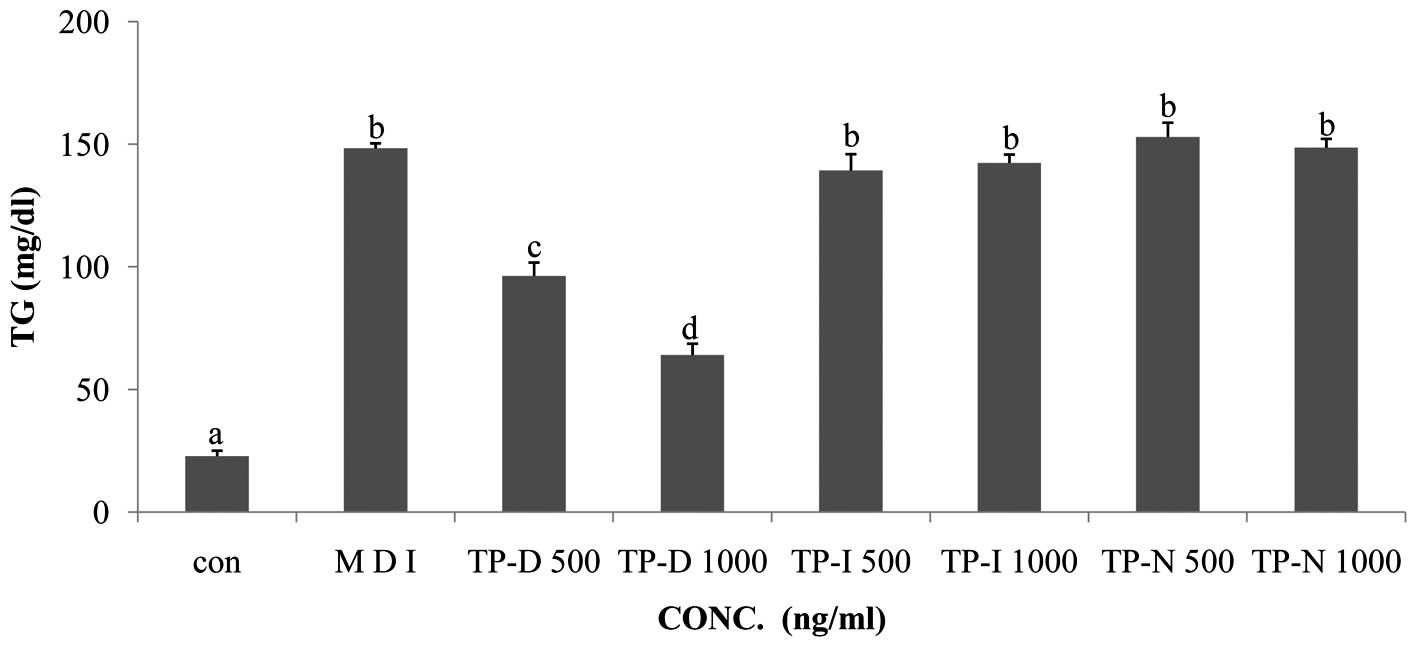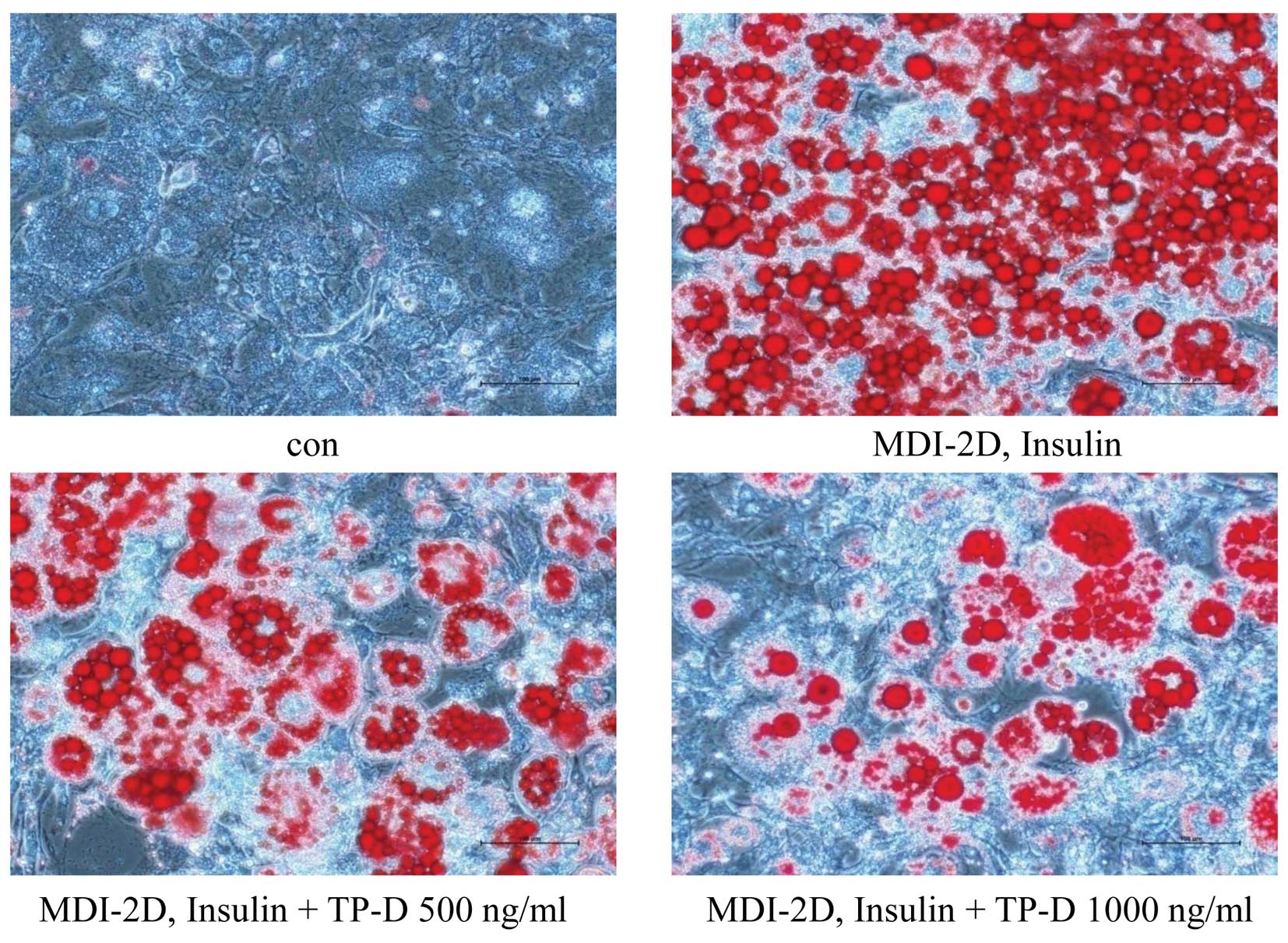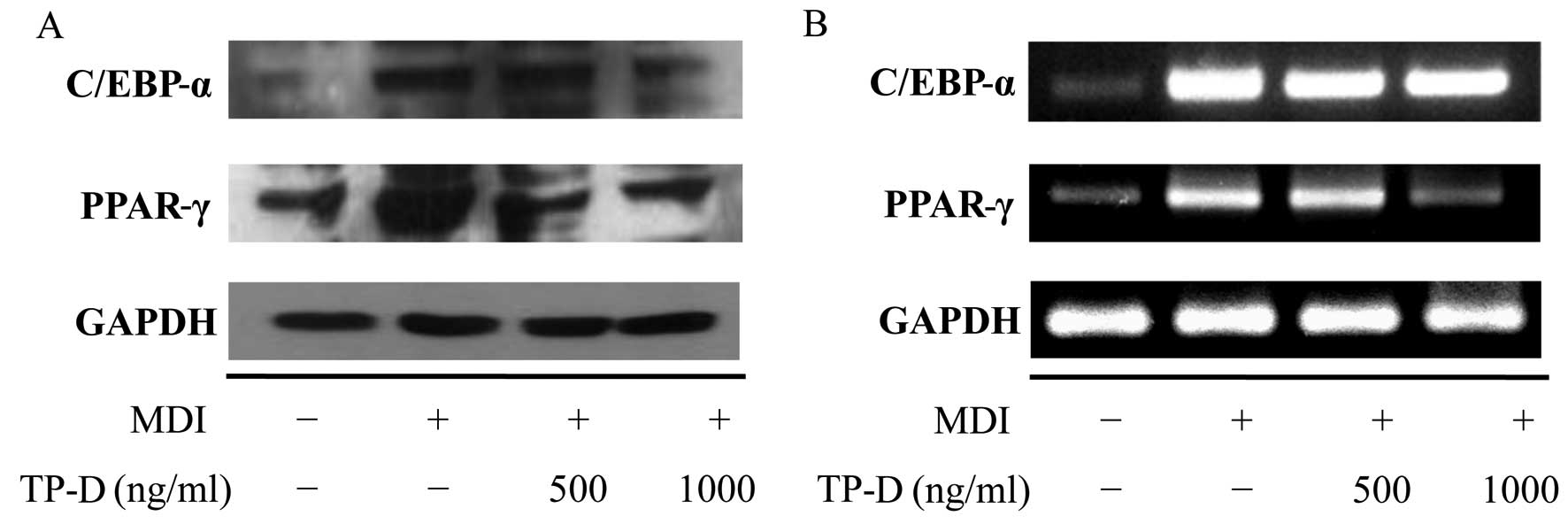|
1
|
Kim DM, Choi HR, Park A, Shin SM, Bae KH,
Lee SC, Kim IC and Kim WK: Retinoic acid inhibits adipogenesis via
activation of Wnt signaling pathway in 3T3-L1 preadipocytes.
Biochem Biophys Res Commun. 434:455–459. 2013. View Article : Google Scholar : PubMed/NCBI
|
|
2
|
Ahn J, Lee H, Kim S and Ha T:
Curcumin-induced suppression of adipogenic differentiation is
accompanied by activation of Wnt/β-catenin signaling. Am J Physiol
Cell Physiol. 298:C1510–C1516. 2010. View Article : Google Scholar : PubMed/NCBI
|
|
3
|
Kopelman PG: Obesity as a medical problem.
Nature. 404:635–643. 2000.PubMed/NCBI
|
|
4
|
Lew EA: Mortality and weight: Insured
lives and the American Cancer Society studies. Ann Intern Med.
103:1024–1029. 1985. View Article : Google Scholar : PubMed/NCBI
|
|
5
|
Visscher TL and Seidell JC: The public
health impact of obesity. Annu Rev Public Health. 22:355–375. 2001.
View Article : Google Scholar : PubMed/NCBI
|
|
6
|
Carrill KK: Biological effects of fish
oils in relation to chronic disease. Lipis. 21:731–732. 1986.
|
|
7
|
Mehta J, Lopez LM and Wargovich T:
Eicosapentaenoic acid: Its relevance in atherosclerosis and
coronary artery disease. Am J Cardiol. 59:155–159. 1987. View Article : Google Scholar : PubMed/NCBI
|
|
8
|
Lee HS, Kim HJ, Choi JI, et al:
Antioxidant activity of the ethanol extract from cooking drips of
Thunnus thynnus by gamma irradiation. J Korean Soc Food Sci Nutr.
37:810–814. 2008. View Article : Google Scholar
|
|
9
|
Lee JA, Ahn EK, Hong SS and Oh JS:
Anti-obesity effect of ethyl acetate extracts from Agrimonia pilosa
Ledeb. in 3T3-L1 preadipocytes. J Korean Soc Food Sci Nutr.
41:161–167. 2012. View Article : Google Scholar
|
|
10
|
Smas CM and Sul HS: Control of adipocyte
differentiation. Biochem J. 309:697–710. 1995.PubMed/NCBI
|
|
11
|
Carey M: The enhanceosome and
transcriptional synergy. Cell. 92:5–8. 1998. View Article : Google Scholar : PubMed/NCBI
|
|
12
|
Darlington GJ, Ross SE and MacDougald OA:
The role of C/EBP genes in adipocyte differentiation. J Biol Chem.
273:30057–30060. 1998. View Article : Google Scholar : PubMed/NCBI
|
|
13
|
Brun RP, Kim JB, Hu E, Altiok S and
Spiegelman BM: Adipocyte differentiation: A transcriptional
regulatory cascade. Curr Opin Cell Biol. 8:826–832. 1996.
View Article : Google Scholar : PubMed/NCBI
|
|
14
|
Hu E, Tontonoz P and Spiegelman BM:
Transdifferentiation of myoblasts by the adipogenic transcription
factors PPAR gamma and C/EBP alpha. Proc Natl Acad Sci USA.
92:9856–9860. 1995. View Article : Google Scholar : PubMed/NCBI
|
|
15
|
Shevchenko A, Wilm M, Vorm O and Mann M:
Mass spectrometric sequencing of proteins silver-stained
polyacrylamide gels. Anal Chem. 68:850–858. 1996. View Article : Google Scholar : PubMed/NCBI
|
|
16
|
Beaudoin A: New technique for revealing
latent fingerprints on wet, porous surfaces: Oil Red O. J Forensic
Identif. 54:413–421. 2004.
|
|
17
|
Rosen ED, Walkey CJ, Puigserver P and
Spiegelman BM: Transcriptional regulation of adipogenesis. Genes
Dev. 14:1293–1307. 2000.PubMed/NCBI
|
|
18
|
Jeon T, Hwang SG, Hirai S, Matsui T, Yano
H, Kawada T, Lim BO and Park DK: Red yeast rice extracts suppress
adipo-genesis by down-regulating adipogenic transcription factors
and gene expression in 3T3-L1 cells. Life Sci. 75:3195–3203. 2004.
View Article : Google Scholar : PubMed/NCBI
|
|
19
|
Cornelius P, MacDougald OA and Lane MD:
Regulation of adipocyte development. Annu Rev Nutr. 14:99–129.
1994. View Article : Google Scholar : PubMed/NCBI
|
|
20
|
Hursting SD and Hursting MJ: Growth
signals, inflammation, and vascular perturbations: Mechanistic
links between obesity, metabolic syndrome, and cancer. Arterioscler
Thromb Vasc Biol. 32:1766–1770. 2012. View Article : Google Scholar : PubMed/NCBI
|
|
21
|
Kant R: Sweet proteins – potential
replacement for artificial low calorie sweeteners. Nutr J. 4:52005.
View Article : Google Scholar
|
|
22
|
Unger RH and Zhou YT: Lipotoxicity of
beta-cells in obesity and in other causes of fatty acid spillover.
Diabetes. 50(Suppl 1): S118–S121. 2001. View Article : Google Scholar : PubMed/NCBI
|
|
23
|
Hunter E: PUFA and eicosanoid research.
JAOCS. 64:10881987.
|
|
24
|
Kang MK and Song KB: Quality
characteristics of Gochujang with the addition of skipjack cooking
broth as protein source. Korean J Food Preserv. 13:457–464.
2006.
|
|
25
|
Kim JS, Yeum DM, Kang HG, Kim IS, Kong CS,
Lee TG and Heu MS: Fundamentals and applications for canned foods.
95. Hyoil Publishing Co.; Seoul, Korea: pp. 351–360. 2002
|
|
26
|
Green H and Kehinde O: An established
preadipose cell line and its differentitation in culture. II.
Factors affecting the adipose conversion. Cell. 5:19–27. 1975.
View Article : Google Scholar : PubMed/NCBI
|
|
27
|
Lee H, Bae S and Yoon Y: The
anti-adipogenic effects of (−)epigallocatechin gallate are
dependent on the WNT/β-catenin pathway. J Nutr Biochem.
24:1232–1240. 2013. View Article : Google Scholar : PubMed/NCBI
|
|
28
|
He Y, Li Y, Zhao T, Wang Y and Sun C:
Ursolic acid inhibits adipogenesis in 3T3-L1 adipocytes through
LKB1/AMPK pathway. PLoS One. 8:e701352013. View Article : Google Scholar : PubMed/NCBI
|
|
29
|
Farmer SR: Transcriptional control of
adipocyte formation. Cell Metab. 4:263–273. 2006. View Article : Google Scholar : PubMed/NCBI
|















